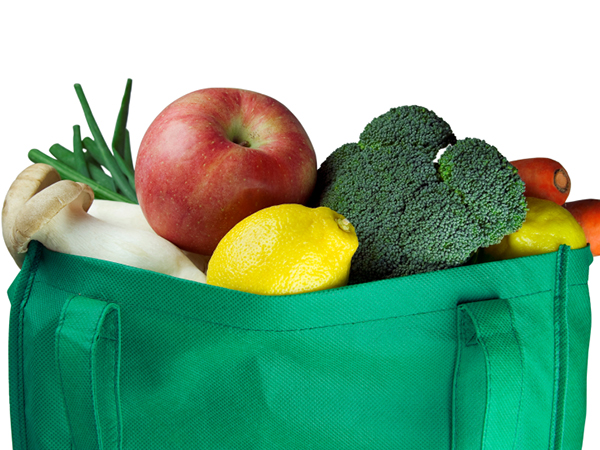Your Location:Home - Hot Topics > - Content
News and Information
6 Tips to Lighten Your Carbon Foodprint
Time:2017-04-24 12:37:01
Source:Academy of Nutrition and Dietetics

Carpooling, biking and public transit are all obvious ways to decrease your impact on the environment. Additionally, there are plenty of easy shopping-related actions to lighten your carbon foodprint while eating healthier.
Buy Locally and in Season
Not only does eating locally grown fruits and vegetables save fossil fuel, food is likely fresher, tastes better, costs less and retains more nutrients. Plus, it supports local farmers and keeps dollars in the community. Locate local farmers markets, as well as community-supported agriculture organizations, with the USDA's Local Food Directories.
While organic foods are generally more expensive than conventional foods, organic produce purchased in-season is usually comparable in price to conventional produce. Current research also shows both short- and long-term benefits to our population and the planet with organic and other sustainable production systems, including reduced nutrient pollution, improved soil organic matter, lower energy use, and reduced pesticide residues in food and water. Biodiversity is enhanced in organic agricultural systems, which makes these farms more resilient to unpredictable weather patterns and pest outbreaks, as is predicted with climate change.
Eat More Plant-based Foods
Animal-based food production emits more greenhouse gases and requires more land and water than plant-based food production. Eating more plant-based protein foods such as beans, lentils and tofu in place of animal-based protein foods is one way to reduce your carbon foodprint.
Reduce Packaging
Buying in bulk reduces the amount of plastic, paper, metal and energy that goes into manufacturing the packaging. If bulk isn't available, buy in larger packages such as "family sizes" rather than individual sizes.
BYOB to the Grocery
Bring your own bags. Even reusing paper or plastic supermarket bags from previous visits can lessen the impact of the 100 billion petroleum-based plastic bags used each year in the U.S., which often end up as litter, in the landfill and as a pollutant of our fresh waters.
Conserve Energy in the Kitchen
Purchase Energy Star appliances, which are rated as energy-efficient, if possible. Other energy-saving tips:
Know what you need before you open the refrigerator or freezer.
Cover the pot to heat food more quickly or use a pressure cooker.
During summer months, run the hood fan to keep gas and heat out of your kitchen so you require less air conditioning to cool the house.
Cook larger quantities and freeze in single meal portion sizes, which not only saves energy, but gets you almost instant home-cooked meals on other days.
Save Water
It is predicted that water, not fuel, will be our scarcest commodity in the not-to-distant future. So, don't let the sink faucet run.
Soak dishes in a sink of hot, soapy water to loosen food, wash and rinse all at once.
If you use a dishwasher, don't bother rinsing the dishes (just scrape them) and run the dishwasher only when it is full.
Repair leaks and drips.
Install aerators in faucets to make less water more efficient.
Don't use running water to defrost frozen food, instead thaw it in advance in the refrigerator.
Decrease Garbage
In addition to reducing the packaging you bring home, compost your food waste. Rather than filling the trash can, your food waste — such as fruit and vegetable scraps — can nourish your garden. Use any container by the sink and haul it outside when it's full. Some municipalities offer free or reduced-price composting bins or bins can be purchased at local garden shops.
When hosting or attending a party, use inexpensive ceramic dishes, real silverware and re-usable plastic cups. Avoid using disposable products. If you must, use disposables that are accepted as part of your neighborhood recycling program.
Information provided by Renee Hoffinger, Christine McCullum-Gomez, PhD, RD, and Anne-Marie Scott, PhD, RD, of the Academy of Nutrition and Dietetics' Hunger and Environmental Nutrition Dietetic Practice Group.
Buy Locally and in Season
Not only does eating locally grown fruits and vegetables save fossil fuel, food is likely fresher, tastes better, costs less and retains more nutrients. Plus, it supports local farmers and keeps dollars in the community. Locate local farmers markets, as well as community-supported agriculture organizations, with the USDA's Local Food Directories.
While organic foods are generally more expensive than conventional foods, organic produce purchased in-season is usually comparable in price to conventional produce. Current research also shows both short- and long-term benefits to our population and the planet with organic and other sustainable production systems, including reduced nutrient pollution, improved soil organic matter, lower energy use, and reduced pesticide residues in food and water. Biodiversity is enhanced in organic agricultural systems, which makes these farms more resilient to unpredictable weather patterns and pest outbreaks, as is predicted with climate change.
Eat More Plant-based Foods
Animal-based food production emits more greenhouse gases and requires more land and water than plant-based food production. Eating more plant-based protein foods such as beans, lentils and tofu in place of animal-based protein foods is one way to reduce your carbon foodprint.
Reduce Packaging
Buying in bulk reduces the amount of plastic, paper, metal and energy that goes into manufacturing the packaging. If bulk isn't available, buy in larger packages such as "family sizes" rather than individual sizes.
BYOB to the Grocery
Bring your own bags. Even reusing paper or plastic supermarket bags from previous visits can lessen the impact of the 100 billion petroleum-based plastic bags used each year in the U.S., which often end up as litter, in the landfill and as a pollutant of our fresh waters.
Conserve Energy in the Kitchen
Purchase Energy Star appliances, which are rated as energy-efficient, if possible. Other energy-saving tips:
Know what you need before you open the refrigerator or freezer.
Cover the pot to heat food more quickly or use a pressure cooker.
During summer months, run the hood fan to keep gas and heat out of your kitchen so you require less air conditioning to cool the house.
Cook larger quantities and freeze in single meal portion sizes, which not only saves energy, but gets you almost instant home-cooked meals on other days.
Save Water
It is predicted that water, not fuel, will be our scarcest commodity in the not-to-distant future. So, don't let the sink faucet run.
Soak dishes in a sink of hot, soapy water to loosen food, wash and rinse all at once.
If you use a dishwasher, don't bother rinsing the dishes (just scrape them) and run the dishwasher only when it is full.
Repair leaks and drips.
Install aerators in faucets to make less water more efficient.
Don't use running water to defrost frozen food, instead thaw it in advance in the refrigerator.
Decrease Garbage
In addition to reducing the packaging you bring home, compost your food waste. Rather than filling the trash can, your food waste — such as fruit and vegetable scraps — can nourish your garden. Use any container by the sink and haul it outside when it's full. Some municipalities offer free or reduced-price composting bins or bins can be purchased at local garden shops.
When hosting or attending a party, use inexpensive ceramic dishes, real silverware and re-usable plastic cups. Avoid using disposable products. If you must, use disposables that are accepted as part of your neighborhood recycling program.
Information provided by Renee Hoffinger, Christine McCullum-Gomez, PhD, RD, and Anne-Marie Scott, PhD, RD, of the Academy of Nutrition and Dietetics' Hunger and Environmental Nutrition Dietetic Practice Group.
Next articleHow Much Sugar Is In Your Food And Drink?



